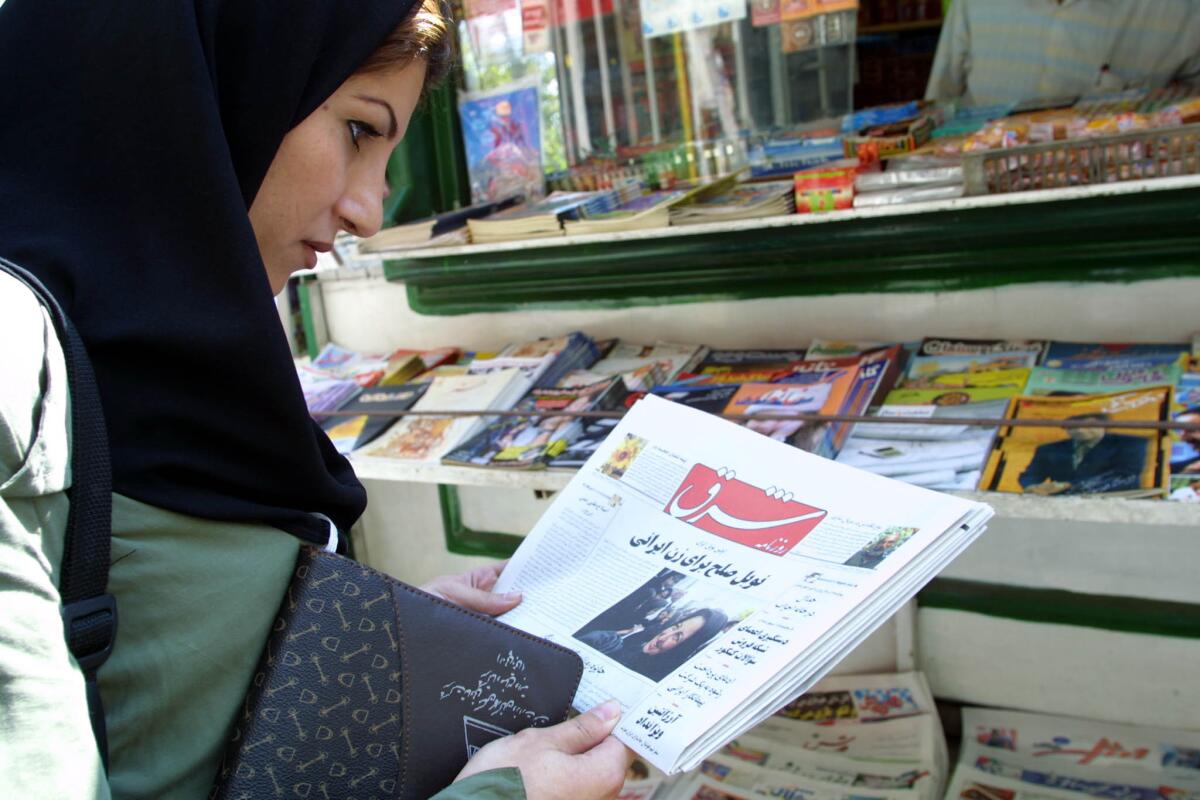Iran arrests more than a dozen journalists

TEHRAN - More than a dozen journalists were arrested in Iran on Sunday and Monday, reportedly detained for ties to foreign Farsi-language outlets, according to Iranian media. The wave of arrests marks a new crackdown on the media in Iran, five months before Iranians head to the polls.
Eleven reporters were reportedly detained late on Sunday, nearly one week after Iranian public prosecutor Gholam Hossain Moseni Ejeie warned, “We know that some of the local journalists have connections with foreigners. If they are arrested, they should not complain.”
Local media reported that the journalists were arrested for cooperating with “anti-revolution Persian-language” media, such as BBC Persian and the U.S.-based Voice of America Persian, which are considered hostile by the Iranian government. Some Iranians watch and listen to the banned channels despite efforts to stop the broadcasts from reaching them.
Farsi is the name of the Persian language spoken in Iran. The Iranian exile community generally refers to itself as Persian.
Iranian officials have argued that Farsi outlets based abroad are trying to paint Iran in an unflattering light to undercut the state. Government critics widely believe the crackdown is a political gesture to intimidate reformist writers ahead of a presidential election this summer, pressuring them to tamp down their criticism before Iranians go to the polls.
Since the beginning of January, a number of Iranian journalists have been summoned for questioning about which candidate they plan to support and what they thought about a recent speech by Supreme Leader Ayatollah Ali Khamenei stating that since the revolution, “elections have always been free,” according to the press freedom group Reporters Without Borders.
“The constant persecution of journalists keeps on intensifying by the day … now, five months before the next election in June 2013, a clear warning is being given – journalists and news media will be gagged,” Reporters Without Borders secretary-general Christophe Deloire said in a statement Monday.
News of Sunday’s arrests emerged late because some workers were held into the night. Police arrived at the office of one of the targeted newspapers, Shargh, to detain some of the journalists while holding others inside the offices until roughly 10 p.m., according to a Shargh employee.
Shargh has been repeatedly closed in the past, once after publishing a cartoon critical of President Mahmoud Ahmadinejad, once for interviewing an exiled poet known for explicit works about female sexuality. The new crackdown, however, appeared to come as a surprise.
“He was in the newspaper office and things seemed like a normal day,” a friend of political satirist and detainee Pouria Alami said, speaking anonymously because of concerns for his own safety. “It really made me sad when I heard he was arrested some hours later.”
Several more journalists were reportedly arrested on Monday, according to Iranian news websites with close links to government security and intelligence branches. The journalists worked for the newspapers Etemad, Arman and Bahar Aseman, the last a reformist paper closely identified with former President Akbar Hashemi Rafsanjani, a political rival of Ahmadinejad.
Though many of the arrested journalists worked for reformist outlets, the government also targeted a conservative website, Tabnak, which was taken offline Sunday after failing to delete critical comments left by users, according to the Nasim and Mashregh news websites.
ALSO:
Fire survivors recall deadly chaos in Brazil club
Egypt’s Morsi orders emergency rule in 3 cities to stem rioting
Mali town recalls Islamist invaders as both terrifying and gentle
Mostaghim reported from Tehran and Alpert from Los Angeles
More to Read
Sign up for Essential California
The most important California stories and recommendations in your inbox every morning.
You may occasionally receive promotional content from the Los Angeles Times.










